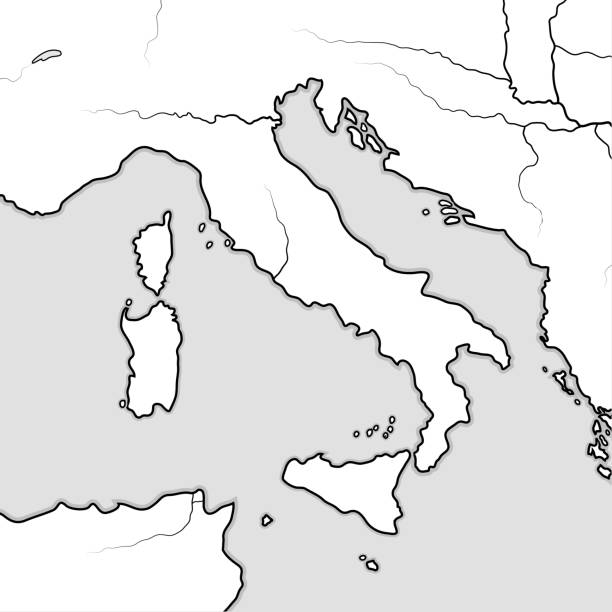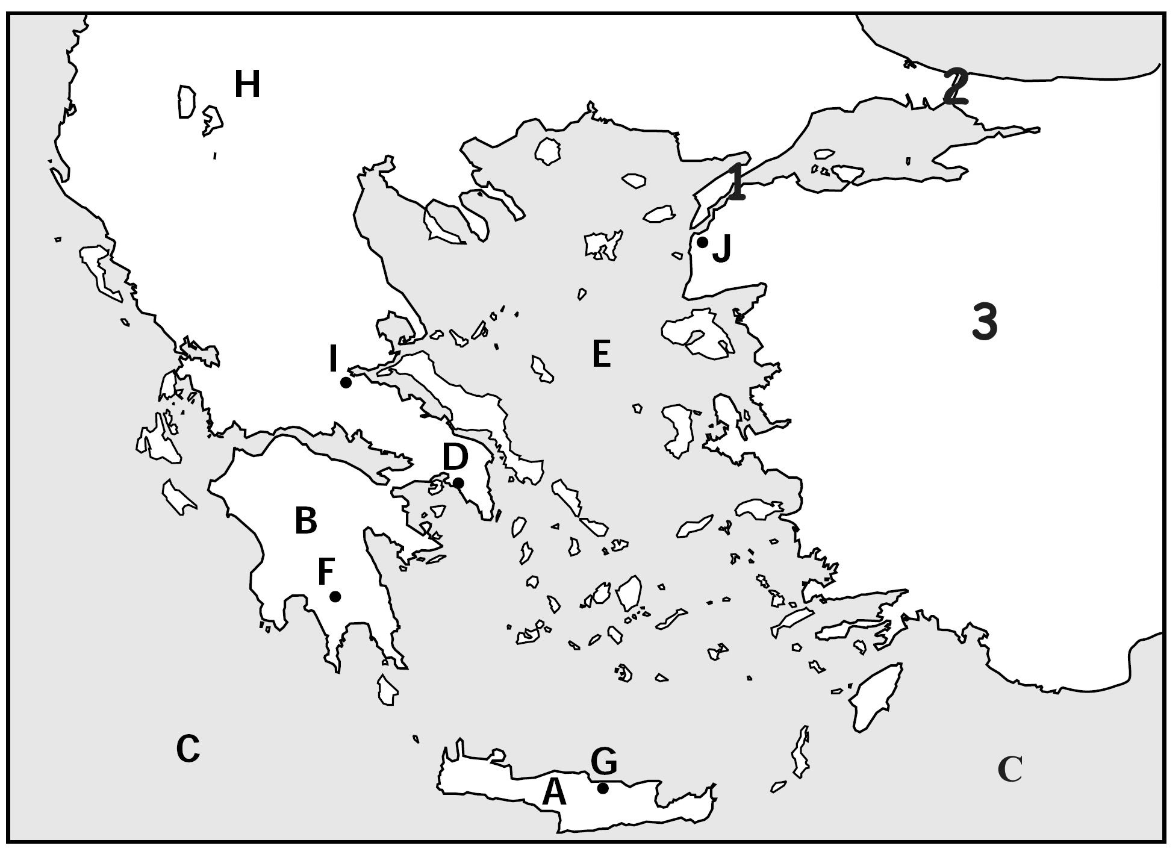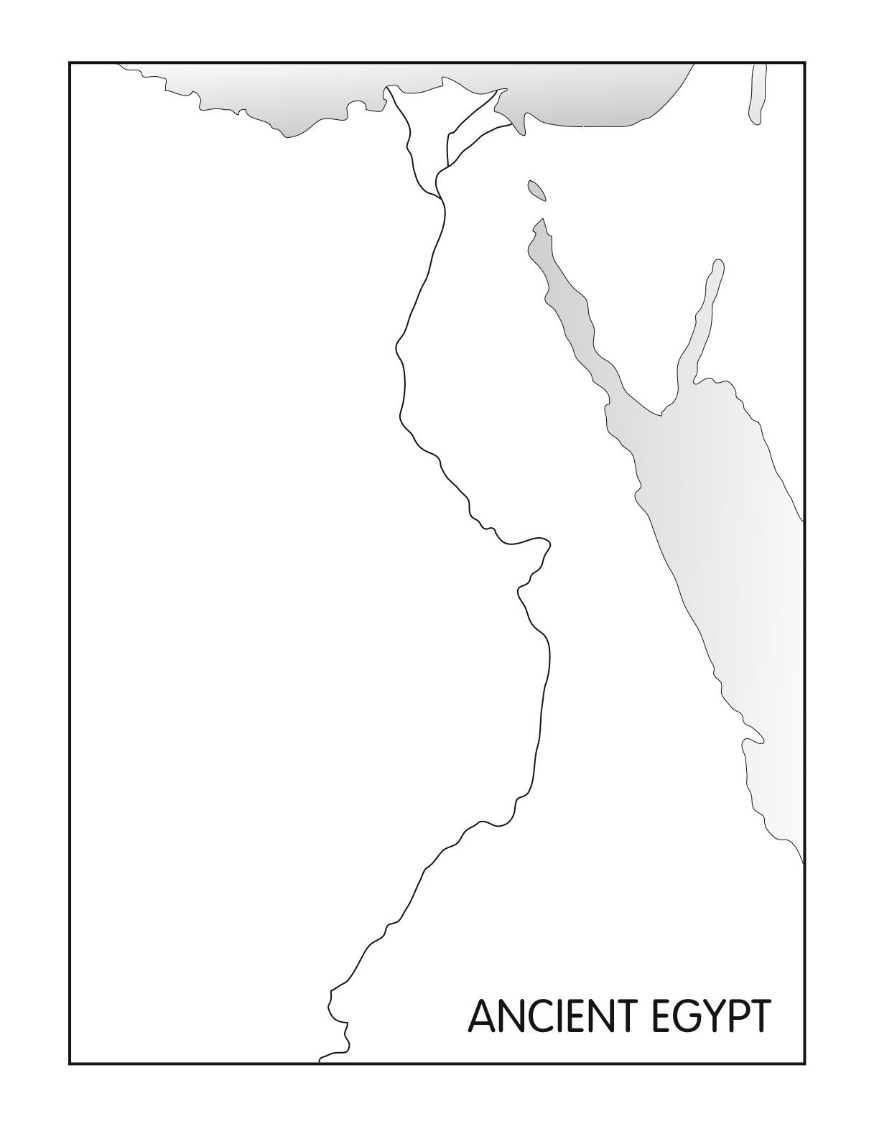Label: Italy, Rome, the Mediterranean Sea, and Greece on the map.

Italy, Rome, the Mediterranean Sea, and Greece
Names of two Nile River civilizations.
Egypt and Kush.
Name of the first civilization to develop in the Aegean region, and the period that their civilization lasted.
The Minoans; 2500 B.C.- 1450 B.C.
Name of brothers who are said to have founded Rome in Roman Mythology.
Romulus and Remus.
Define: cataract
a waterfall or rapids in a river
Name the following labels on the map: A, D, E, F,

A: Crete
D: Athens
E: Aegean Sea
F: Sparta
List of two physical features of the Nile River Valley that protected Egyptians from invaders.
Mountains, steep cliffs, large boulders, cataracts.
List three negative consequences of the Dark Ages.
1. Trade slowed down
2. People made fewer things to sell
3. Most people were very poor
4. Farmers only practiced subsistence farming
5. People stopped writing and keeping records
Names of the three groups that inhabited the Italian peninsula around 1000 BC.
Latins, Etruscans, and Greeks
Name given to a government run by religious leaders.
theocracy
Label the following on the map: Nile River, Nile delta, Upper and Lower Egypt, Red Sea, Eastern and Western Deserts.

Nile River, Nile delta, Upper and Lower Egypt, Red Sea, Eastern and Western Deserts.
Roles of: Ra, Osiris, Seth, and Horus
Ra: Egyptian sun-god and head of all Egyptian gods.
Osiris: the god of the dead and fertility.
Seth: the god of deserts, oases, sandstorms, and violence.
Horus: the god of the sky and hunting.
Compare and contrast Sparta and Athens (at least three differences and similarities).
Sparta: warrior/military society, economy based on agriculture, boys left home at 7 to join military, men entered army at age 20 and retired at 60, Spartan women were independent- they could own land and travel, Spartan girls were trained in sports, government was an oligarchy, free thinking and new ideas discouraged.
Athens: society of thinkers, only boys received a formal education in a wide range of academic subjects until age 18, girls were taught domestic roles by their mothers, women were home-makers and lacked independence, economy based on agriculture, only males participated in political process, democratic system of government.
Where was the first Roman settlement established.
List three reasons why the location of the first Roman settlement was ideal.
The Italian peninsula on Palatine Hill.
It was next to a source of fresh water, protected them from invaders, and provided the Romans with fertile soil for farming.
Name of a Persian religion based on the belief of one god.
Zoroastrianism
Who was Hatshepsut?
List one of her contributions to the New Kingdom.
Hatshepsut was a female pharaoh of the New Kingdom who ascended to power in 1473 B.C.
Hatshepsut:
1. Built magnificent temples and restored old monuments.
2. Promoted trade within and outside of the region.
Definition of the Golden Age of Athens. For how long did it last?
The Golden Age of Athens lasted from 461-429 B.C. It was a period of flowering of Athenian culture, economy, and politics under Pericles.
Names of three largest cities in the Roman empire and their locations.
Rome (Italy), Antioch (Syria), and Alexandria (Egypt).
1. Someone who writes or performs epic poems or stories about heroes and their deeds.
2. A bucket attached to a long pole used to transfer river water to storage basins.
1. bard
2. shadoof
List two ways that the Phoenicians impacted Egyptian culture.
1. Their invention of the alphabet and a system of writing influenced that of the Egyptians.
2. Their trade routes and settlements encouraged the spread of goods and ideas across the ancient world.
Who were the following figures, and list one contribution or responsibility of each:
1. Hippocrates
2. Socrates
3. Sophocles
4. Zeus
5. Apollo
1. Hippocrates- Greek physician and father of modern medicine.
2. Socrates- Greek philosopher. Developed the Socratic method of questioning still used today in academia. Encouraged students to think critically and explore new ways of understanding the world.
3. Sophocles- Greek playwright. Writer of tragedy.
4. Zeus- King of the gods in Greek Mythology. God of the sky, rain, and lightning.
5. Apollo- Son of Zeus. God of light.
What events marked the beginning and end of the Roman Republic.
Time period of the Roman Republic.
The Roman Republic began with the overthrow of Tarquin the Proud who was the last Roman monarch in 509 BC.
The Republic ended when Julius Caesar seized power in 60 BC.
Define:
1. delta
2. satrap
1. A fan-shaped area of silt near where a river flows into the sea.
2. The governor of a province in ancient Persia.